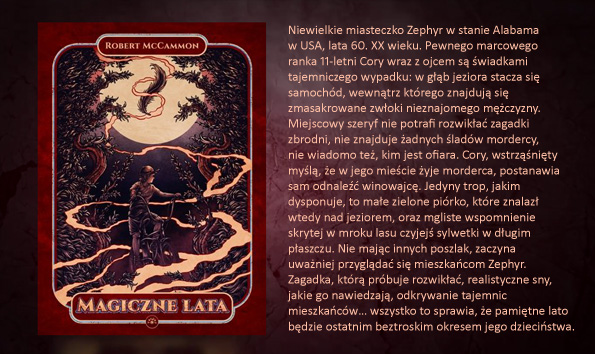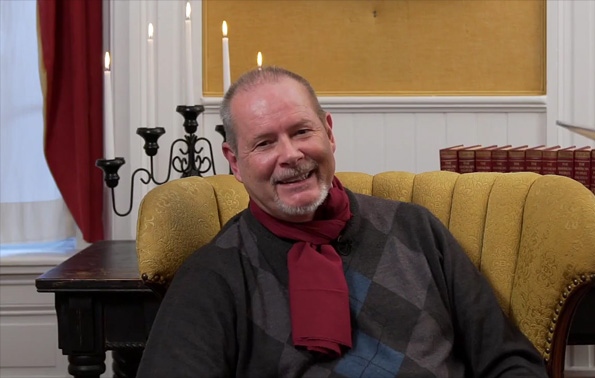From the Polish book site Booklips.pl, October 22, 2022
 Although he was already a recognized author of horror novels, his great popularity was ensured by Boy’s Life, a nostalgic and remarkable novel about growing up in the early 1960s in the American South, published in 1991. Robert McCammon has devoted the last two decades to a series of books about Matthew Corbett, a fantastic saga set in 17th-century colonial America. Recently, Polish readers have received both the new edition of Boy’s Life and Speaks the Nightbird, the first installment of the Corbett series. We had the opportunity to exchange a few sentences with the author.
Although he was already a recognized author of horror novels, his great popularity was ensured by Boy’s Life, a nostalgic and remarkable novel about growing up in the early 1960s in the American South, published in 1991. Robert McCammon has devoted the last two decades to a series of books about Matthew Corbett, a fantastic saga set in 17th-century colonial America. Recently, Polish readers have received both the new edition of Boy’s Life and Speaks the Nightbird, the first installment of the Corbett series. We had the opportunity to exchange a few sentences with the author.
Sebastian Rerak: Apparently when you were a kid, there was a haunted house in your neighborhood. Did you ever dare to explore it? Was it a source of inspiration itself?
Actually, it was not really a “haunted house,” but the story in the neighborhood was that the ghost of a man with a scarred face was in the basement. I did explore around the house but it was locked up. I would say more inspiration came from my grandfather who told me stories of a supposedly haunted house in his neighborhood in South Carolina when he was a small boy. Those stories did a lot to hone and improve my imagination, because I could visualize the actions in the stories he told and I think that helped me at least want to write tales that the reader might be able to see.
There are fragments of Boy’s Life that read like a charming love letter to the pop culture of the era. What discoveries of yours – in terms of film, books, mags or music – do you consider the most important for your development as a storyteller?
Well I was reading a lot and listening to a lot of music as a young boy. I also had a subscription to a magazine called “Famous Monsters Of Filmland” that ran stories on not only the then- current horror movies, but also those in the past and even in the silent era. So much went into my development as a writer that I can’t even begin to list everything—the listing I give at the end of “Boy’s Life” is only a part of what fed my interest to hopefully become a writer.
Boy’s Life still appeal to new readers, even though they obviously can’t relate to the experience of growing up in the 1960s South of USA. What in your opinion makes this book so timeless?
I think because no matter where anyone has grown up, there is a shared sense of joy in one’s youth and I believe that is part of the appeal. Also the sense of the mystery of life, the importance of friendship and family, and the idea that the magic of youth never has to be completely gone from a person’s life. It all depends on a person’s viewpoint and attitude.

Were you aware that Boy’s Life reached a certain cult status in Poland after it’s 1996 edition (curiously, it was advertised as a horror back then)?
No, I wasn’t aware of that but I’m very glad to hear it!
Boy’s Life depicts a magical world of a growing young teen. Yet the magic wears off while he’s maturing. Once could ask: when magic is gone, what is there instead?
There is the continued “magic” of learning to know yourself, of becoming aware of the feelings of other people and giving respect to those feelings, of realizing that you and every person who has ever been born holds within the self a world that cannot and will not ever be repeated. It is the family you grew up with, where you were born, the influences you have had, your outlook on life, your likes and dislikes, your interests and hobbies, your friends and what you do on this earth. No one will ever be repeated, and we should understand and find great joy and wonder in this.
While there is a lot of nostalgia in Boy’s Life, one can also find darker aspects of that period. Racial tensions, impoverishment (e.g. in case of Chile’s family), animal abuse (e.g. creature from the lost world)… You certainly didn’t let the story became bucolic and carefree.
Even though the book has youthful magic at its center, it also had to be true to the era in which it was set. Would we know happiness if we didn’t sometimes experience sadness? Would we know success if we didn’t sometimes face failure? Would we understand kindness if we never saw cruelty? I think all these are very important to the development of a human being, and Boy’s Life is certainly also about Cory’s development not only as a writer but as a person too, in the open way he views the world and invites different experiences—though sometimes the experiences are forced upon him, like it or not!
I know publishers had a hard time with Boy’s Life manuscript as it was difficult to pinpoint the book’s genre. At the end you were proved right to defend your ideas. It must felt like a big victory on its own?
It did, but I’d much rather it had gone smoothly from the first. I was very disappointed when my publisher at the time didn’t understand the book, and I thought—the publisher was the one who should’ve been encouraging me to do bigger and better works, no matter what the genre was.
After Boy’s Life you also published Gone South and then went on a writing hiatus. What was a reason for that?
Well, my hiatus was because I had written Speaks The Nightbird and again I was having trouble getting the book published. I felt Speaks The Nightbird was the next step in my evolution as a writer but the people who were vital in publishing the book didn’t feel that way. So I thought my career was over. I took my crayons and went home, and I thought I was finished.

You came back with Speaks the Nightbird which also has been recently published in Poland. Do you somehow feel excited for the Polish readers who are yet to follow the Matthew Corbett series?
I do. I really like the Matthew Corbett character and I enjoy researching the history. I also enjoy mixing up the history with a little strangeness, so to speak. So Matthew’s continuing story has been both a pleasure and just sheer fun for me to write.
You seem to be committed to Matthew Corbett series nowadays. Can you see yourself writing a completely different, one-off novel anytime soon?
Yes. I’m nearly at the end of the Matthew Corbett series here in America. I have begun book number 10, which will be the last of the Corbett books. I will miss him and the historical world he and his companions have lived in, but I do have future plans for more one-off novels.
Now that both Speaks the Nightbird and Boy’s Life reissues are available in Poland, have you received any new feedback from the readers from my country?
I have been told that there are a lot of positive, enthusiastic reviews from the readers, as well as lots of social media posts. I’m glad they’re enjoying the books.
Meanwhile The Listener is scheduled for a premiere next year. How would you recommend that novel?
It is set in New Orleans in 1934 and involves a young black man who becomes involved in a kidnapping plot by two of the worst villains I could think up. He can “hear” in his head the voice of the little white girl who’s been kidnapped from a wealthy family, and she also has this ability to “hear” him. So he becomes the only one who can communicate with her, and might be able to find and save her.
Would you say that Boy’s Life changed your life in more ways than simply give you a household name as a writer?
What it did is give me great confidence as a writer. I thought that if I did this book successfully, as I wanted it to be, I could do anything. Also it gave me the desire to step away from the “horror genre” and try new things. And not to be afraid to try new things. So in those regards it certainly did change my life.
Interviewer: Sebastian Rerak
Photos Robert McCammon/YouTube
